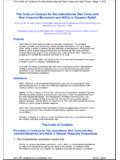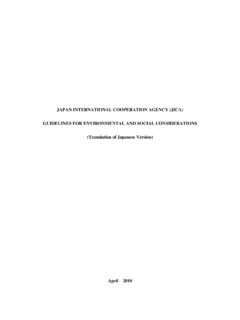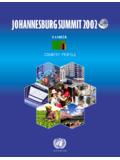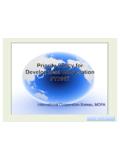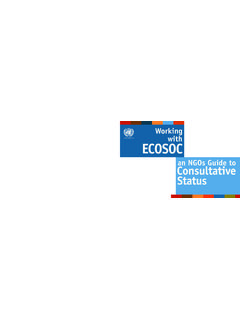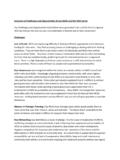Transcription of THE INFLUENCE OF GOVERNMENT POLICY AND …
1 OECD Global Forum on international Investment OECD Investment Division THE INFLUENCE OF GOVERNMENT POLICY AND ngos ON CAPTURING PRIVATE INVESTMENT Gayle Allard, & Candace Agrella Martinez, Breakfast Session 1: New frontiers in investment promotion This paper was submitted in response to a call for papers conducted by the organisers of the OECD Global Forum on international Investment. It is distributed as part of the official conference documentation and serves as background material for the relevant session in the programme. The views expressed in this paper do not necessarily represent those of the OECD or its member governments.
2 1 The INFLUENCE of GOVERNMENT POLICY and ngos on Capturing Private Investment Gayle Allard, Professor of Economic Environment and Country Analysis Chair, Department of Economics Instituto de Empresa Maria de Molina, 11 28006 Madrid, Spain (34) 915-568-9600 (office) (34) 91-568-9710 (fax) Email: Candace Agrella Martinez, Assistant Professor of international Business John Cook School of Business St. Louis University 3674 Lindell Blvd. St. Louis, MO 63108 (314) 977-7603 (office) (314) 977-7188 (fax) Email: ABSTRACT Our paper applies new institutional economics theory to a unique data set of the world s low-income economies to examine the association between host governments social policies and their ability to attract foreign direct investment.
3 We add to this another new data set to explore the direct and indirect role of nongovernmental organizations ( ngos ) in the business-society- GOVERNMENT interface. We find that a host GOVERNMENT s social inclusion policies are strongly associated with a country s FDI inflows. ngos , however, obtain no statistically significant indirect effect on this relationship and only weak statistical significance as a direct INFLUENCE on FDI inflows. Despite these mixed results, the findings of this exploratory study suggest future directions of research of interest to POLICY makers and business scholars. Key words: foreign direct investment, globalization, nongovernmental organizations ( ngos ), social policies 2.
4 Polities significantly shape economic performance because they define and enforce the economic (North, 1994: 366). Globalization, the ongoing process of integration and interconnection of states, markets, technologies, and firms, (Barkema, Baum, and Mannix, 2002) appears to be here to stay. Increased levels of trade and foreign direct investment worldwide, a cause or effect of the closer interdependence of world economies, are a reality. One of the most striking trends of recent increases in private investment is the emergence of nongovernmental organizations ( ngos ) as important conduits for aid and as providers of development services in low-income economies.
5 According to the United Nations Development Program, by the end of the 20th century more than 50,000 ngos were working at the grass-roots level in developing countries, and their activities were affecting the lives of 250 million individuals (Besley and Ghatak, 1999). The increasingly important role of ngos as they have advanced from mere service-providers to major players with the funds and potential to INFLUENCE POLICY and institutions has received ample empirical and theoretical attention (Besley and Ghatak, 1999; Doh and Guay, 2006; Eden, 2004; Keim, 2003; Nancy and Yontcheva, 2006; Teegen, Doh, and Vachani, 2004).
6 Further, as the civil society counterparts of multinational enterprises (MNEs) and governments, ngos have become major new organizational forms and vehicles to deliver social services such as poverty relief and environmental protection (Teegen et al., 2004: 475). They have influenced corporate strategy by inducing firms to seek a competitive advantage through reputational assets or by responding to pressures from the moral marketplace (Hess, Rogovsky, and Dunfee, 2002), and they have caused many corporate executives to internalize their commitment to social objectives and corporate social responsibility even when there is no apparent economic benefit to the firm or other individual (Doh and Guay, 2006: 58).
7 In the international arena ngos often create and institutionalize new norms in the societies where they operate (Keck and Sikkink, 1998; Lawrence, Hardy, and Phillips, 2002). Private investment, ngos , and the latter s role in the ability of host governments to promote private investment into their local economies, are the focal point of this paper and new institutional economics provides the underpinning rationale that guides its logic. We start with the premise that ngos (civil society organizations) INFLUENCE the institutional context in which they operate; the same context that defines the choice sets of multinational firms (the private sector) when they invest in host governments (the public sector).
8 The institutional environment provides the framework in which an NGO operates, but an NGO can also establish formal rules and informal norms of its own that in turn INFLUENCE , over time, other actors in society. What is the relationship among these private, public, and civil society sectors? Do ngos modify the impact of host GOVERNMENT policies (as manifestations of formal institutions) on the private sector? What is the INFLUENCE of ngos when they act alone in the institutional setting as compared to their INFLUENCE when they act in tandem with host GOVERNMENT POLICY ? How do they affect the local environment that is perceived by foreign investors?
9 We seek to answer these questions as we examine the relationship among actors in three sectors of society: ngos , host governments, and business. Building on the elements of new institutional theory highlighted above, this paper examines ngos and host GOVERNMENT POLICY , the former as agents of globalization (Teegen et al., 2004) and the latter as promoters of social welfare and inclusion (wealth distribution). It then tests the direct effect of each as well as the moderating role of ngos in influencing firm-level private investment. This paper purports to shed light on the interconnectedness of a society s business, public and civil society sectors across developing countries.
10 It empirically tests the effectiveness that a host GOVERNMENT s social policies have in attracting private investment as well as the emerging role of ngos in today s globalized world. Its main contribution is to add to the public POLICY /NGO research stream a new set of data and an understanding of how the main forces in society operate and cooperate in promoting foreign direct investment. It is hoped that scholars will conduct further research to refine our understanding of the dual role of host GOVERNMENT POLICY and ngos in the 3 ongoing process of integration and interconnection of states, markets, technologies, and firms, (Barkema, Baum, and Mannix, 2002).










